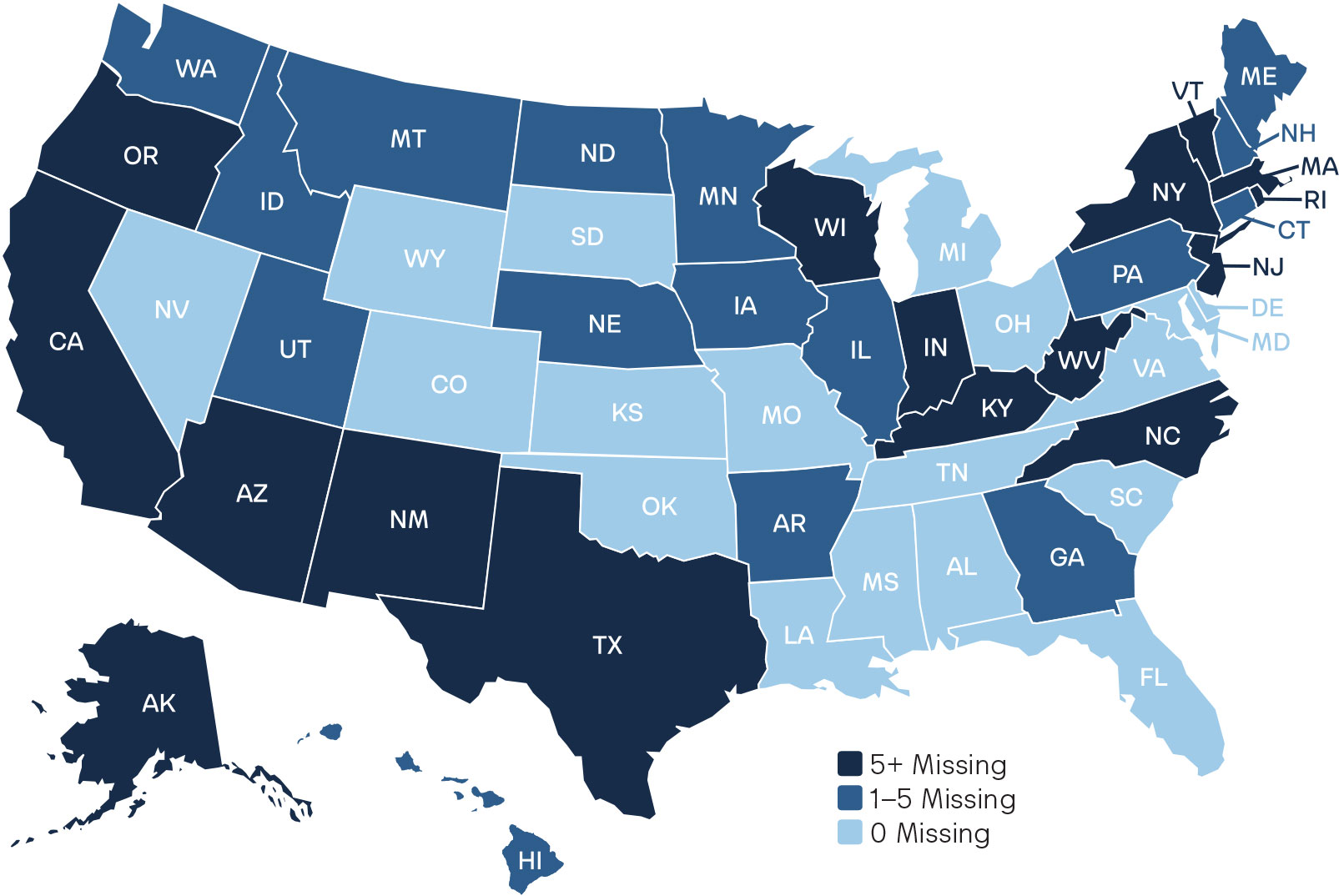
State Compliance with the Sex Offender Registry and Notification Act
Introduction
Federal measures are being taken to bring order back to the streets of American cities. President Trump’s Executive Order Ending Crime and Disorder on America’s Streets targets lawlessness stemming from America’s homeless population.1 Many homeless people are addicted to drugs or have severe mental health problems, and former criminals form a disproportionate amount of the homeless population. Researchers estimate that more than 37 percent of homeless individuals in the U.S. have been to prison, and more than 79 percent have been to jail.2 One homeless subgroup has been inspiring increased concern as a source of civil disruption: homeless sex offenders, who make up a significant portion of the unsheltered homeless population in many states.
A recent study by Cicero Institute Policy Director Devon Kurtz found that at least 10 percent of unsheltered homeless populations are registered sex offenders in 32 states, and more than half are registered sex offenders in eight states.3 Harris, Levenson, and Ackerman (2014) found that between two and five percent of the nation’s registered sex offenders are homeless, significantly higher than the nationwide average of less than one percent.4 General safety concerns arise from harboring large populations of sex offenders on city streets. Many states are not compliant with the Sex Offender Registration and Notification Act, missing the legislation necessary to properly register and track unsheltered registered sex offenders.

In Ending Crime and Disorder on America’s Streets, President Trump directs the U.S. Attorney General, the Secretary of Health and Human Services, the Secretary of Housing and Urban Development, and the Secretary of Transportation to reassess discretionary grant programs to states if the registration and notification obligations of registered sex offenders are not met, particularly in the case of registered sex offenders with no fixed address. Without legislative action, states could have tens of millions of dollars in federal grants withheld.
What is SORNA?
The Sex Offender Registration and Notification Act (SORNA), also referred to as the Adam Walsh Act (AWA), is a multipurpose act intended toward the “creation of a comprehensive nationwide registry system to regulate the movement and activities of sex offenders across jurisdictions” (Miner 2011, 88).5 The Bill is named after Adam Walsh, a six-year-old boy who was abducted, sexually assaulted, and murdered by a repeat sex offender. SORNA is the culmination of previous bills targeting repeat sex offenders, including the Jacob Wetterling Act of 1994 and the Pam Lyncher Tracking and Identification Act of 1996.6 Lawmakers, concerned about rising recidivism rates for sex offenders in the early 2000s and the increasing use of the internet by sexual predators to lure victims, passed SORNA in 2006.7 The patchwork of federal laws targeting sexual offenders enacted throughout the 1990s was consolidated into a comprehensive bill mandating uniformity and consistency in sex offender registration and tracking across jurisdictions.8 However, many states are not fully in compliance with SORNA, lacking laws mandating the tracking and registration of certain sex offenders.
Missing SORNA Policies
Missing SORNA Policies by State

The above map represents the diverse set of missing SORNA policies. States are most commonly missing laws requiring the registration and tracking of sex offenders. Nearly half of the surveyed states did not implement a required registration duration, reporting frequency to law enforcement, or offense-based tiering for sex offenders. Ten surveyed states also failed to maintain an online public registry listing required offenders and offender information. Rampant homelessness is already taxing law enforcement. Considering the high proportion of homeless sex offenders, state failure to register sex offenders and maintain public registries exacerbates existing problems surrounding homelessness. Frequently absent policies also included a failure to implement a required 21-day notice of international travel, required early registry removal standards, the immediate reporting of registration information changes, and the enforcement of required juvenile offenses.9
Importance of SORNA
State-level SORNA compliance helps law enforcement better supervise sex offenders and ensures consistency across state lines. An up-to-date, standardized notification and tracking system is essential for law enforcement, particularly for monitoring transient homeless sex offenders. Sex offender registries were initially intended to provide investigators with a ready-made list of possible suspects in the vicinity of a crime. Their usefulness to the criminal justice system has grown to include providing prosecutors with additional leverage during plea deal negotiations and allowing law enforcement to use charges for an offender’s failure to register or other violations as a stand-in for crimes they could not prove.10 Homeless sex offenders must also be monitored to ensure their distance from parks and schools.
Sex offender registries and community notification policies both rely, to some degree, on the residential addresses of sex offenders to provide useful information to law enforcement and the public. These address-based management strategies offer law enforcement very little useful information about homeless sex offenders, who cannot provide an address. However, aspects of SORNA implementation, such as a required reporting frequency for unsheltered sex offenders to law enforcement, would inform authorities of the whereabouts of transient sex offenders and provide valuable data to legislators. Policymakers also could go beyond SORNA to require GPS and electronic monitoring of transient sex offenders.
Conclusion
Most discussions of homelessness policy have neglected the sex offender subpopulation. But the recent White House Executive Order makes it clear that going forward, this subpopulation will be a priority of the federal government. States can take straightforward steps to comply with their new obligations by implementing state-level legislation that is in line with SORNA standards for registration, monitoring, and notification.

Stay Informed
Sign up to receive updates about our fight for policies at the state level that restore liberty through transparency and accountability in American governance.
